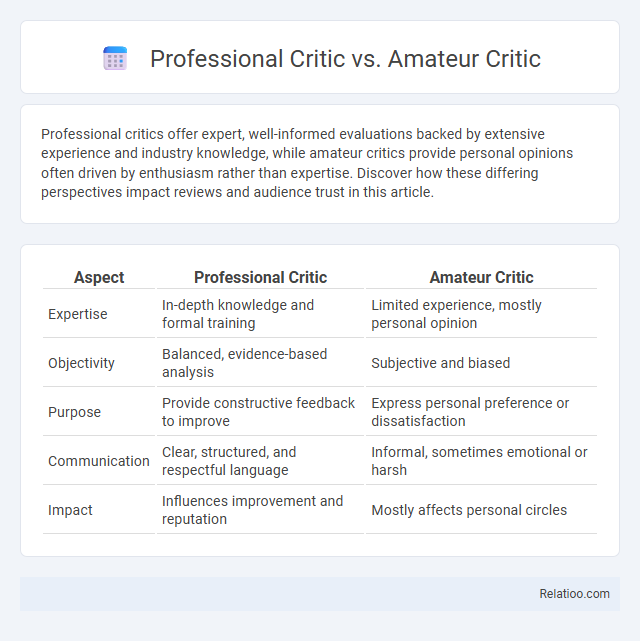Professional critics offer expert, well-informed evaluations backed by extensive experience and industry knowledge, while amateur critics provide personal opinions often driven by enthusiasm rather than expertise. Discover how these differing perspectives impact reviews and audience trust in this article.
Table of Comparison
| Aspect | Professional Critic | Amateur Critic |
|---|---|---|
| Expertise | In-depth knowledge and formal training | Limited experience, mostly personal opinion |
| Objectivity | Balanced, evidence-based analysis | Subjective and biased |
| Purpose | Provide constructive feedback to improve | Express personal preference or dissatisfaction |
| Communication | Clear, structured, and respectful language | Informal, sometimes emotional or harsh |
| Impact | Influences improvement and reputation | Mostly affects personal circles |
Understanding the Role of a Professional Critic
A professional critic possesses specialized knowledge, extensive experience, and formal training that enable them to evaluate works with authority and depth, providing nuanced insights that go beyond personal opinions. Unlike amateur critics, whose perspectives may be subjective and based on personal taste, professional critics employ established criteria and critical methodologies to assess artistic or cultural products systematically. Your understanding of the role of a professional critic highlights their commitment to informed analysis, influencing public perception and contributing to the ongoing dialogue within the artistic community.
Defining the Amateur Critic
An amateur critic engages in evaluating art, literature, or performance without formal training or professional experience, often sharing opinions through informal platforms such as blogs or social media. Unlike professional critics, who rely on expertise, methodology, and industry standards, amateur critics bring diverse perspectives influenced by personal taste and enthusiasm. The term "critic" broadly refers to anyone who analyzes or judges creative works, encompassing both amateurs and professionals in the field.
Qualifications and Credentials: A Comparative Overview
Professional critics possess formal qualifications and credentials, often including degrees in journalism, literature, or art history, alongside experience working for reputable publications or institutions. Amateur critics typically lack formal training or official credentials, relying on personal passion and informal platforms such as blogs or social media to share opinions. The term "critic" broadly encompasses both, but professional critics are distinguished by verified expertise and recognized authority in their field.
Depth of Analysis: Expertise vs. Enthusiasm
Professional critics provide in-depth analysis grounded in extensive knowledge and formal training, offering nuanced evaluations supported by industry standards and historical context. Amateur critics contribute observations driven by personal enthusiasm and subjective experience, often lacking the technical expertise required for comprehensive critical assessment. While both perspectives add value, professional critics deliver more precise and authoritative insights that inform audiences and influence cultural discourse.
Influence on Public Opinion and Industry
Professional critics possess established expertise and credibility, wielding substantial influence on public opinion and industry trends through authoritative reviews in prominent media outlets. Amateur critics, often sharing opinions on social platforms or personal blogs, impact niche audiences and contribute to grassroots discussions but generally lack the wide reach or perceived authority of professionals. Your engagement with both types shapes the cultural conversation, balancing formal industry insights with diverse, community-driven perspectives.
Objectivity and Subjectivity in Criticism
Professional critics base their evaluations on standardized criteria, extensive knowledge, and industry experience, ensuring a higher level of objectivity in their assessments. Amateur critics often incorporate personal tastes and subjective opinions, which can lead to varying interpretations and less consistent conclusions. The term "critic" broadly encompasses both professional and amateur voices, with the balance between objectivity and subjectivity depending largely on expertise and analytical rigor.
Writing Style and Approach: Formal vs. Informal
Professional critics employ a formal writing style characterized by structured analysis, technical vocabulary, and objective evaluation grounded in industry standards. Amateur critics often adopt an informal approach, using conversational language and personal opinions, focusing more on emotional reactions than technical assessment. General critics may blend both styles, varying their tone and depth depending on the platform and audience, balancing formal critique with accessible commentary.
Impact on Artists and Creative Work
Professional critics provide expert, well-researched evaluations that can significantly influence an artist's reputation and career opportunities by shaping public perception and industry recognition. Amateur critics offer more spontaneous, diverse opinions that can create grassroots support or highlight emerging trends, though their impact is less formalized and inconsistent. Your engagement with both types of critics helps artists adapt, grow, and reach broader audiences through varied feedback and exposure.
Accessibility: Gatekeeping vs. Open Platforms
Professional critics often operate within gatekeeping frameworks, where access is limited by industry standards, formal credentials, and established publication channels. Amateur critics thrive on open platforms like blogs and social media, offering diverse perspectives without traditional barriers. Your engagement with criticism depends on whether you prefer curated expertise or a broad range of accessible, user-generated content.
The Future of Criticism in the Digital Age
The future of criticism in the digital age is marked by the evolving roles of professional critics, amateur critics, and general critics, each leveraging digital platforms to influence public opinion. Professional critics maintain authority through expertise and industry connections, while amateur critics gain prominence via social media and user-generated content, democratizing access to critical discourse. The convergence of these voices fosters a more diverse and dynamic critical landscape, reshaping cultural consumption and media evaluation.

Infographic: Professional Critic vs Amateur Critic
 relatioo.com
relatioo.com